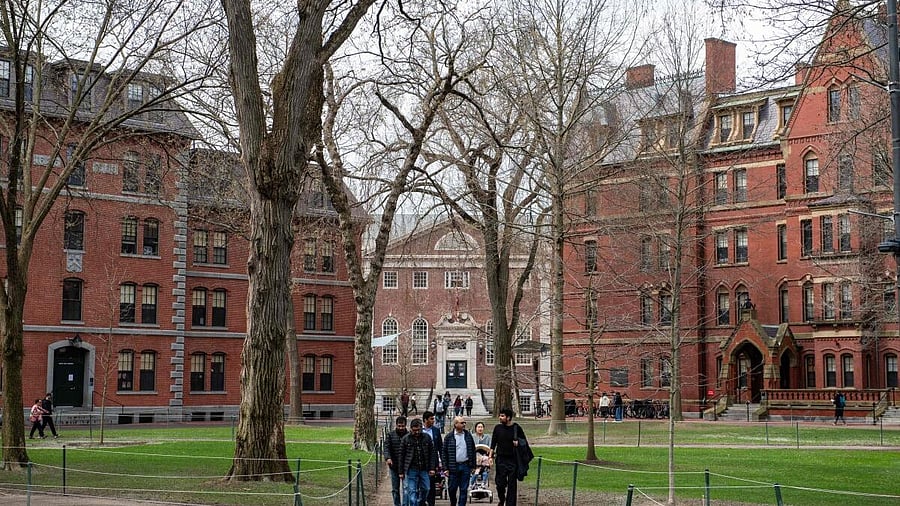
The Harvard University
Credit: Reuters Photo
The Donald Trump administration’s decision to bar Harvard University from enrolling international students is not just a spat between a populist government and an elite academic institution. In truth, it is a fundamental confrontation over power, ideology and the purpose of education in a deeply polarised society. The stakes extend far beyond Harvard’s gates, touching on constitutional principles, the stability of US higher education and the lives of thousands of international students who travelled to America in pursuit of better opportunities but now find themselves mere pawns in a political chess game.
At one level, this move fits a now-familiar pattern in Trump-era politics: elite-bashing as populist theatre. With its global prestige and progressive values, Harvard makes for an irresistible target. It symbolises everything Trump’s base has been told to distrust: cosmopolitanism, liberal intellectualism and a vaguely defined "deep state". By accusing the university of harbouring antisemitic protests, collaborating with Chinese entities and noncompliance with federal demands for data on student activism, the administration cloaks its crackdown in the language of national security and civil rights. But make no mistake — this is less about protecting Jewish students or curbing espionage and more about chilling dissent and asserting control over academia.
The legal dimension is both urgent and precarious. Harvard’s lawsuit alleges that the administration’s actions violate the First Amendment and due process, which is a serious claim. Harvard’s case hinges on the argument that the federal government is using immigration tools as blunt instruments to punish a politically disfavoured institution. Legal experts are split: some believe the university’s rights were clearly infringed, while others caution that courts tend to defer to executive authority in immigration matters, particularly when framed as national security. Even if Harvard prevails — its legal firepower and public support suggest it could — the damage is already done.
Over 6,800 international students, most of them graduate researchers, face the risk of deportation, disruption and uncertainty. These students are not agitators or subversives; they are scholars, scientists and thinkers who invested their futures in a country that once promised intellectual freedom. For them, this is not an abstract policy debate. It is a personal crisis. The government’s demand for detailed surveillance of international students’ protest activity is a step towards authoritarianism, incompatible with the values of a free society. However, Harvard’s response has offered little by way of concrete reassurance to the students caught in limbo. The irony is bitter: in a standoff allegedly about safeguarding student rights, the students themselves have become collateral damage.
The implications go far beyond Harvard. If the federal government can revoke student visa privileges from Harvard, what’s to stop it from targeting other universities that host protests or challenge state policy? Institutions reliant on international enrollment and federal funding may begin self-censoring, curtailing speech and surveilling students to avoid scrutiny. The ripple effect could erode academic freedom nationwide, undermining the openness that once made US universities a global magnet for talent and innovation. There is also a stark economic truth here. International students pump over $40 billion into the US economy annually and fill vital roles in STEM research and university funding structures. As they start choosing Canada, the UK, France or Australia instead, American higher education won’t just suffer ideologically, it will take a financial and scientific hit. And no amount of political posturing will reverse the brain drain once it accelerates.
What is needed now is clarity, courage and care. The administration, if it genuinely aims to address antisemitism or espionage concerns, should do so with transparency and precision, not through blanket punishments that endanger innocent students. Harvard must go beyond legal resistance and take immediate action to support affected students, offer legal help and ensure academic continuity. More broadly, it is time for a systemic rethink of how America handles international education. Safeguards must be implemented to prevent political retaliation from masquerading as security policy. Immigration decisions that impact thousands of students should require judicial oversight. Universities must recognise that defending academic freedom means more than just protecting their brand; it means showing up for the people who make them what they are.
In the end, this is more than a legal battle or an institutional standoff. It is a reckoning with the kind of country the US wants to be. Will it remain the beacon of global education it claims to be, a sanctuary for diverse thought and a defender of democratic values? Or will it become a place where ideology dictates intellect, and visas are granted or revoked at the whim of politics? The answer to that question won’t just shape Harvard’s future, it will define America’s standing in the world. And for thousands of students who dreamed of building their lives here, the answer has never mattered more.
(The writer is former professor and dean, Christ Deemed to be University, Bengaluru)